
Animal Farm is a beast fable, in the form of a satirical allegorical novella, by George Orwell, first published in England on 17 August 1945. It tells the story of a group of anthropomorphic farm animals who rebel against their human farmer, hoping to create a society where the animals can be equal, free, and happy. Ultimately, the rebellion is betrayed and, under the dictatorship of a pig named Napoleon, the farm ends up in a state as bad as it was before.
Snowball is a character in George Orwell's 1945 novel Animal Farm. He is largely based on Leon Trotsky, who led the opposition against Joseph Stalin (Napoleon). Snowball is depicted as an intellectual white pig whose leadership, dedication, and feats for Animal Farm is unparallel to any others on the farm, however he is rivaled by Napoleon who has hatred for Snowball. In the 1954 film adaptation of Animal Farm, he was voiced by Maurice Denham, and was voiced by Kelsey Grammer in the 1999 television adaptation.
George Orwell's 1945 allegorical novel Animal Farm contains various anthems adopted by the eponymous farm, most notably the original anthem "Beasts of England" and its later replacement "Comrade Napoleon".
Boxer is a character from George Orwell's 1945 novel Animal Farm. He is shown as the farm's dedicated and loyal laborer. Boxer serves as an allegory for the Russian working-class who helped to oust Tsar Nicholas and establish the Soviet Union, but were eventually betrayed by the government under Joseph Stalin.
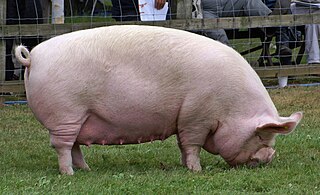
Major is the first major character described by George Orwell in his 1945 novel Animal Farm. An elderly Middle White boar, his "purebred" of pigs is a kind, grandfatherly philosopher of change.
Mr. Jones of Manor Farm is a fictional character in George Orwell's 1945 allegorical novel Animal Farm. Jones is an allegory for Tsar Nicholas II of Russia. Jones is overthrown by the animals of his farm, who represent Bolshevik and liberal revolutionaries.

The Sheep-Pig, or Babe, the Gallant Pig in the US, is a children's novel by Dick King-Smith, first published by Gollancz in 1983 with illustrations by Mary Rayner. Set in rural England, where King-Smith spent twenty years as a farmer, it features a lone pig on a sheep farm. It was adapted as the 1995 film Babe, which was a great international success. King-Smith won the 1984 Guardian Children's Fiction Award, a once-in-a-lifetime book award judged by a panel of British children's writers.

The Information Research Department (IRD) was a secret Cold War propaganda department of the British Foreign Office, created to publish anti-communist propaganda, including black propaganda, provide support and information to anti-communist politicians, academics, and writers, and to use weaponised information, but also disinformation and "fake news", to attack not only its original targets but also certain socialists and anti-colonial movements. Soon after its creation, the IRD broke away from focusing solely on Soviet matters and began to publish pro-colonial propaganda intended to suppress pro-independence revolutions in Asia, Africa, Ireland, and the Middle East. The IRD was heavily involved in the publishing of books, newspapers, leaflets and journals, and even created publishing houses to act as propaganda fronts, such as Ampersand Limited. Operating for 29 years, the IRD is known as the longest-running covert government propaganda department in British history, the largest branch of the Foreign Office, and the first major anglophone propaganda offensive against the USSR since the end of World War II. By the 1970s, the IRD was performing military intelligence tasks for the British Military in Northern Ireland during The Troubles.

Animal Farm is a 1954 adult animated drama film directed by documentarians John Halas and Joy Batchelor. It was produced by Halas and Batchelor and funded in part by the Central Intelligence Agency (CIA), who also made changes to the original script. Based on the 1945 novel of the same name by George Orwell, Maurice Denham provides the voice for all the animals in the film.
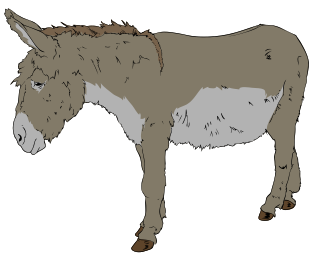
Benjamin is a donkey in George Orwell's 1945 novel Animal Farm. He is also the oldest of all the animals. He is less straightforward than most characters in the novel, and a number of interpretations have been put forward to which social class he represents as regards to the Russian Revolution and the Soviet Union. Benjamin also represents the old people of historical Russia because he remembers the old laws that have been changed.

Animal Farm is a 1999 political comedy-drama television film directed by John Stephenson and written by Alan Janes. Based on the 1945 novel of the same name by George Orwell and serving as an allegory of the Russian Revolution and its aftermath, the film features an ensemble cast including Kelsey Grammer, Ian Holm, Julia Louis-Dreyfus, Patrick Stewart, Julia Ormond, Paul Scofield, Charles Dale, Pete Postlethwaite, Alan Stanford and Peter Ustinov. In the film, a group of anthropomorphic animals revolt successfully against their human owner, only to slide into a more brutal tyranny among themselves.
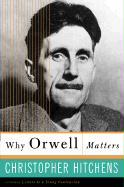
Why Orwell Matters, released in the UK as Orwell's Victory, is a book-length biographical essay by Christopher Hitchens. In it, the author relates George Orwell's thoughts on and actions in relation to: The British Empire, the Left, the Right, the United States of America, English conventions, feminism, and his controversial list for the British Foreign Office.

Snowball's Chance is a parody and unofficial sequel to George Orwell's Animal Farm written by John Reed, in which Snowball the pig returns to the Manor Farm after many years' absence, to install capitalism — which proves to have its own pitfalls.

In the dystopian novel Nineteen Eighty-Four, by George Orwell, Emmanuel Goldstein is the principal enemy of the state of Oceania. The political propaganda of The Party portrays Goldstein as the leader of The Brotherhood, a secret, counter-revolutionary organization who violently oppose the leadership of Big Brother and the Ingsoc régime of The Party.
Doublethink is a process of indoctrination in which subjects are expected to simultaneously accept two conflicting beliefs as truth, often at odds with their own memory or sense of reality. Doublethink is related to, but differs from, hypocrisy.

Napoleon is a fictional character and the main antagonist of George Orwell's 1945 novel Animal Farm. While he is at first a common farm pig, he exiles Snowball, another pig, who is his rival for power, and then takes advantage of the animals' uprising against their masters to eventually become the tyrannical "President" of Animal Farm, which he turns into a dictatorship, eventually becoming every bit as openly cruel as its original human owner and being perceived as physically indistinguishable from a human at the very end of the story.

Nineteen Eighty-Four is a dystopian novel and cautionary tale by English writer George Orwell. It was published on 8 June 1949 by Secker & Warburg as Orwell's ninth and final book completed in his lifetime. Thematically, it centres on the consequences of totalitarianism, mass surveillance, and repressive regimentation of people and behaviours within society. Orwell, a democratic socialist, modelled the authoritarian state in the novel on the Soviet Union in the era of Stalinism and Nazi Germany. More broadly, the novel examines the role of truth and facts within societies and the ways in which they can be manipulated.
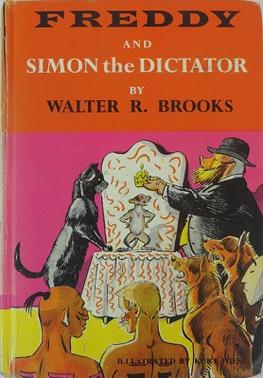
Freddy and Simon the Dictator (1956) is the 24th book in the generally humorous children's series Freddy the Pig written by American author Walter R. Brooks and illustrated by Kurt Wiese. It tells how animals in New York State rebel against humans, destroying property and taking control of farms. At the same time, Freddy’s friend Mr. Camphor is pressured into running for governor. The situations collide when animals take over Camphor’s estate, imprisoning the political figures there.
The Ministry of Truth, the Ministry of Peace, the Ministry of Love, and the Ministry of Plenty are the four ministries of the government of Oceania in the 1949 dystopian novel Nineteen Eighty-Four, by George Orwell.
The Ministry of Peace concerns itself with war, the Ministry of Truth with lies, the Ministry of Love with torture and the Ministry of Plenty with starvation. These contradictions are not accidental, nor do they result from ordinary hypocrisy: they are deliberate exercises in doublethink.
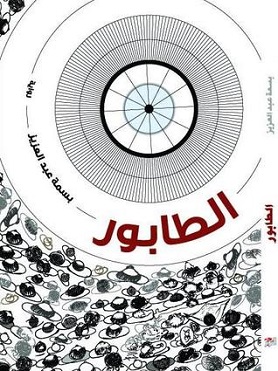
The Queue is a 2013 satire novel by Basma Abdel Aziz. It was first published in English in 2016. The novel explores totalitarianism and bureaucracy through the lens of a fictional Middle Eastern state and the people under its control.













